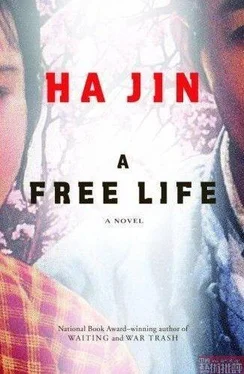A couple, an overweight white woman and a young black man wearing a Vandyke beard, came twice a week. They always bought wonton soup, Peking ravioli, and fish dumplings, but had never left more than one dollar for a tip, usually just some loose change scattered on the table. Whenever they showed up, the waitresses would avoid waiting on them, so Chinchin would assign Aimin and Maiyu to serve them by turns. Sometimes a whole family would dine here: tots crawled under the tables, and youngsters even snuck into the small banquet room upstairs when they used the toilets next to the landing. Two middle-aged gay men turned up every Wednesday evening and wouldn't hesitate to neck in front of others. One afternoon a Caucasian couple came with their four daughters, who looked similar in features, all pretty though a little pallid. Nan was told that this family ate here once a month, right after the father, a dapper man, received his pay. Obviously they weren't rich, but they had good table manners. Nan overheard the youngest girl, about six years old, ask for a walnut cookie for dessert, but her mother said no. The child didn't make another peep. Once they were done with the meal, the father left a ten for tip.
" They always give the same amount, very nice people," Aimin said to Nan, smiling with her nose wrinkled.
Compared with other customers, David Kellman was the most generous tipper. Usually he'd show up midafternoon, when diners were few, and would have Maiyu wait on him. He'd compliment Chinchin on her outfit, and then the two of them would tease each other in a friendly way. However, they'd stop their repartee when Maiyu brought over his order. He talked a lot to Maiyu, and once in front of everyone he invited her out, saying he'd take her to a Broadway show and then to a nice place where they could have a great time.
"I'm already married," she told him, simpering.
"Really? You look so young, like a teenager, but it doesn't matter. We'll have fun." He spoke so loudly that the other diners turned to look his way.
Nan kind of admired Kellman, who seemed good-humored and at ease with himself, and who appeared so well off that even the cuffs of his tailored jacket were monogrammed. In addition, Kellman seemed unafraid of anything and anybody and never minced his words. He said to Maiyu again, "Tell me who's your husband, the lucky guy."
"No, I won't."
"You'd better not, or I'll strangle him." He gave a belly laugh.
Apparently Maiyu was attracted to this man. Her fondness for him often exasperated her husband, especially when she and he worked the same shift. Heng would fume, his eyes smoldering. Through his rage Nan could see the kind of desperation that often marked a man unable to find his way in this place. Nan had met a good number of these men, who, frustrated and disoriented and desperate, would vent their spleen on their wives or girlfriends, though almost without exception they all appeared taciturn in front of others. Deep inside, every one of them was like a keg of gunpowder, ready to explode. Intuitively Nan felt Heng and Maiyu's marriage was floundering.
Soon Kellman stopped showing up, and then Maiyu quit. Rumor had it that she had moved out of her apartment and shacked up with that black man. Nobody dared verify this with Heng, fearing he might go into hysterics, but it was an open secret that his wife had walked out on him. Heng sighed a lot at work and was more reticent than before, though once in a while he'd yell at the other workers without provocation.
Howard, the boss, interviewed several people for the job left by Maiyu. He decided on Yafang Gao, a woman of twenty-four who had arrived in New York a week before. She had graduated from Fudan University and spoke English fluently. She smiled at everyone as if she had worked here for a long time. Her slightly chubby face showed some innate goodness, while her bulbous nose and tiny eye-teeth gave her a youthful look. Her geniality made Nan think she must have had a happy childhood. Howard hired her mainly because she could speak the Shanghai dialect, which none of the staff could understand but which matched the cuisine of the restaurant. Four decades before, Howard had lived in that metropolis too. So at the interview with Yafang he spoke the language, which sounded foreign and slick to Nan. At one point, he overheard Howard saying in English to the applicant, "I'm thrilled to speak our home dialect again!" The boss gave Yafang a copy of Practical English for Restaurant Personnel as well, and from then on called her "my hometown girl."
Because Yafang Gao had to settle in before she could start, Howard let Nan wait tables for a few days. When she began waitress-ing, Nan returned to the kitchen, where from then on he'd cook under Chef Zhang's supervision. He liked the work and enjoyed seeing raw materials change into toothsome dishes. He tried to learn as much as he could, believing Howard might put him in the chef 's position someday.
Yafang turned out to know some of Nan's former schoolmates who had continued to do graduate work at her alma mater in Shanghai. She and Nan often chatted and got along well. Both were amazed that China, though a vast country, was actually a small world. Many people who had come out of their homeland knew of one another. Most of Nan's fellow graduate students had left China. As long as one could speak a foreign language, one would strive to go abroad. Some of them had even landed in Czechoslovakia, Poland, Hungary, Russia, South Africa. "It took me three years to get the approval from my department for visiting America," Yafang told Nan. She had taught English at a technical college in Shanghai.
"Why so long?" he asked.
" The chairman of my department said I was still young and should let the older comrades have a chance first." "So you feel lucky?"
" Certainly. You should have seen the long line of visa applicants outside the U.S. consulate in Shanghai. Some of them went there the night before their interviews, but the American officials turned most of them down."
"I don't think people always know why they want to come to the United States."
"Sure they know, for a better life." "But life here isn't easy at all." "Still, there's freedom."
"Freedom is meaningless if you don't know how to use it. We've been oppressed and confined so long that it's hard for us to change our mind-set and achieve real freedom. We're used to the existence defined by evasions and negations. Most of our individual tastes and natural appetites have been bridled by caution and fear. It's more difficult to break the self-imposed tyranny than the external constraints. In short, we have lost the child in ourselves."
"Wow, you speak like a philosopher, so eloquently."
Heng Chen broke his habitual silence, saying, " Nan is also a poet."
" Are you really?" Yafang batted her glossy eyes, unconsciously licking her top lip.
"I've been trying to write poetry," admitted Nan.
"That means you still have a young heart."
Heng butted in again, "Heh-heh-heh, Nan 's a young-hearted man indeed, also very romantic. More impressive, he doesn't drink or smoke, absolutely a clean man, a model husband."
Nan wanted to call him "a loser" or "a new bachelor," but feeling reluctant to continue the conversation, he merely said, "I've got to go down and cook some pot-stickers." He hurried away to the kitchen.
NAN went back to see his family at the end of September. Pingping and Taotao were overjoyed to have him home again, though Heidi greeted him lukewarmly. Pingping had explained to Heidi several times that Nan had gone to New York just to take a job; perhaps Heidi was afraid she might have to shelter Pingping and Taotao if Nan abandoned them. Nan had promised Heidi on the phone that he would come back as soon as he went through his training at the restaurant. Now, to convince her that he had been learning to be a chef, he cooked a dinner-wonton soup, lemon chicken, and shrimp dumplings-for the Masefields and his family. His cooking was a complete success. Livia loved the wontons so much that she wanted Nan to teach her how to make and boil them. Nan told Pingping what he had put into the stuffing, and she promised Livia that she'd get the wrappers from the Chinese grocery store in Burlington and show her how to wrap and cook wontons. Both Nan and Pingping knew that the girl would forget her interest in a matter of a day or two. Livia rarely persisted in doing anything.
Читать дальше












